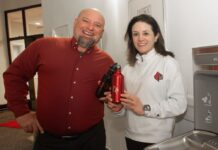There’s an old bumper sticker that says, If you aren’t angry, you aren’t paying attention.
When was the last time you paid attention to water — something most of us take for granted? Last semester, GRASS (Group Recycling and Sustainable Solutions) had a campus screening of the award-winning documentary FLOW: For the Love of Water. Personally, it was a huge wake up call. I had no idea about the shady dealings of the bottled water companies like Coke, Pepsi and Nestle — their effects on water supplies in the surrounding communities, the lack of regulation and the mass amounts of pollution involved in the transportation of bottled water.
FLOW not only woke me up to the realities of the bottled water industry, but it made me want to dig deeper and get involved. So I began doing more research about the issue and telling my friends and family about the movie. In my research, I learned that it takes a lot of oil to produce and ship water plastic bottles — imagine each bottled filled 1/3 full of oil. I learned that since water is considered a low risk food item, it does not have to be as thoroughly tested and regulated at water from the tap. I also found it interesting that 40 percent of bottled water is simply bottled tap water! For example, Aquafina (sold in Louisville) is tap water from Indiana and Kroger bottled water is tap water from Virginia.
Also, the price difference between bottled and tap water is HUGE! You could fill a 16-ounce bottle with Louisville Tap more than 1,000 times for the price of one bottle of bottled water at the store.
After I expressed my concern to those close to me, I took it to the Quad with Tap Water Challenges. I wanted a fun way to begin the conversation, and I had heard that other universities (like Brown, Evergreen and WASHU) that had banned bottled water had done similar demonstrations.
Tap Water Challenges test peoples’ ability to first, see if they can tell the difference between bottled and tap and second, decide which one they like better. Last Earth Day, we tested about 100 students, faculty and staff. Of them, 88 percent said that they preferred the taste of Louisville Tap over both Aquafina and Kroger bottled water (the two most popular brands on campus)!
There are so many reasons to dump bottled water (health, financial, energy and much more). In the fall, I will continue my awareness-raising efforts about this issue, and I am confident that the University of Louisville can make the change. As students, we also need to demand better and more quality water fountains from President Ramsey, so that we do not feel forced to buy bottled water. I ask that you — students, staff and faculty — join me on this quest by joining the Ban the Bottle UofL Facebook group and contact me if you would like to volunteer.


























